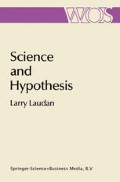Abstract
It has long been common for scholars to maintain that the science of Galileo posed most of the central philosophical and methodological problems for early modern philosophy. Historians as diverse in orientation as Whewell and Mach, Koyré, and Cassirer have seen in Galilean physics the roots of the major philosophical problems of early modern science.1 Doubtless, there are some very important philosophical issues raised by Galilean physics (among them: why nature is quantifiable, the role of ideal cases in physical theory, the character of thought experiments). But it is seriously misleading historically to assert that the philosophical issues implicit in Galileo’s mechanics — or in any science like Galileo’s mechanics — were the central source of intellectual Angst for scientifically-minded philosophers of the 17th and early 18th centuries. I shall suggest briefly and tentatively that we must look elsewhere in the scientific revolution to find those doctrines about nature which were responsible for the chief features of the ‘epistemological revolution’ of the early modern era.
Access this chapter
Tax calculation will be finalised at checkout
Purchases are for personal use only
Preview
Unable to display preview. Download preview PDF.
Notes
Cf. For a sampling of claims about the philosophical significance of Galilean science, see:
A. Koyré, Etudes galiléennes (Paris, 1943 );
A. Koyré, Metaphysics and Measurement (London, 1968 );
E. Cassirer, Das Erkenntnisproblem (Berlin, 1911–20);
E. A. Burtt, Metaphysical Foundations of Modern Science (London, 1932 );
M. Hesse, `Galileo and the Conflict of Realism and Empiricism’, in Galileo nella storia e nella filosofia della scienza (Piza, 1964 );
J. Mittelstrass, Two Concepts of Experience’, forthcoming ina volume to be published by Reidel; and W. Shea, Galileo’s Intellectual Revolution (London, 1972).
It has been a common bias since the time of Kant that Galileo’s science was the catalyst that produced early modern philosophy. It is a reasonable conjecture that the myth about Galileo’s significance for the history of philosophy may owe much to the highly idiosyncratic character of Kant’s conception of the philosophical problems of science.
For a more detailed discussion of the linkages between a ‘postulational’ view of science and the logic of discovery, see Chapter 11.
Author information
Authors and Affiliations
Rights and permissions
Copyright information
© 1981 Springer Science+Business Media Dordrecht
About this chapter
Cite this chapter
Laudan, L. (1981). A Revisionist Note on the Methodological Significance of Galilean Mechanics. In: Science and Hypothesis. The University of Western Ontario Series in Philosophy of Science, vol 19. Springer, Dordrecht. https://doi.org/10.1007/978-94-015-7288-0_3
Download citation
DOI: https://doi.org/10.1007/978-94-015-7288-0_3
Publisher Name: Springer, Dordrecht
Print ISBN: 978-94-015-7290-3
Online ISBN: 978-94-015-7288-0
eBook Packages: Springer Book Archive

